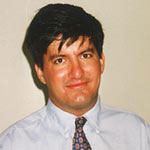|
HOME | SEARCH | ARCHIVE |
|
Former Clinton adviser accepts campus science, technology post
![]()
By Robert Sanders, Public Affairs
| |  Thomas Kalil |
22 August 2001
|
A key technology adviser to former president Clinton, Thomas Kalil, now holds a similar position on campus designed to help develop new research initiatives and increase Berkeley’s role in shaping the national agenda. Kalil served under Clinton for eight years, eventually becoming deputy assistant to the President for technology and economic policy and deputy director of the National Economic Council. He was the point person on a wide range of science, technology and telecommunications issues, including the National Nanotechnology Initiative, the Next Generation Internet, and efforts to expand funding for the physical sciences and engineering. “For eight years, Tom was the center of the Internet revolution,” said Eric Schmidt, chair of Google, Inc. and of Novell, Inc. “He convinced the U.S. government to use Internet e-mail, to put all its services online, and to leave the Internet alone to grow and prosper. Once done, he set out to fund and build Internet II through universities.” As assistant to the chancellor for science and technology, Kalil will help faculty members develop research and education initiatives that respond to national priorities and that build strong partnerships with government agencies, the private sector and community-based organizations. Kalil, who arrived July 10, will primarily work with researchers in the two California Institutes for Science and Innovation in which Berkeley plays a lead role — the California Institute for Bioengineering, Biotechnology and Quantitative Biomedical Research, called QB3, and the Center for Information Technology Research in the Interest of Society (CITRIS). “It is a unique opportunity for Berkeley to have Tom Kalil work with us in the development of the new California Institutes,” said Mary Beth Burnside, vice chancellor for research and a professor of cell and developmental biology. “His breadth of experience and perspective will be an invaluable resource.” He hopes to educate scientists about how to ignite Congressional and public support for research. “The biomedical research community really organized around the idea of doubling the NIH budget, and it worked,” he said, referring to a successful Congressional effort to boost biomedical funding for the National Institutes of Health. “But we need to keep a balanced research portfolio, supporting research in the physical sciences, engineering and social sciences as well. Scientists have to do a better job of articulating what the potential outcomes of research will be, where the research may ultimately lead, so that Congress and the public will support it.” Before joining Clinton, Kalil was a trade specialist at the Washington offices of Dewey Ballantine, where he represented the Semiconductor Industry Association on U.S.-Japan trade issues, intellectual property rights and funding for advanced microelectronics research.
Home | Search | Archive | About | Contact | More News
Copyright 2000, The Regents of the University of California.
Produced and maintained by the Office of Public Affairs at UC Berkeley.
Comments? E-mail berkeleyan@pa.urel.berkeley.edu.